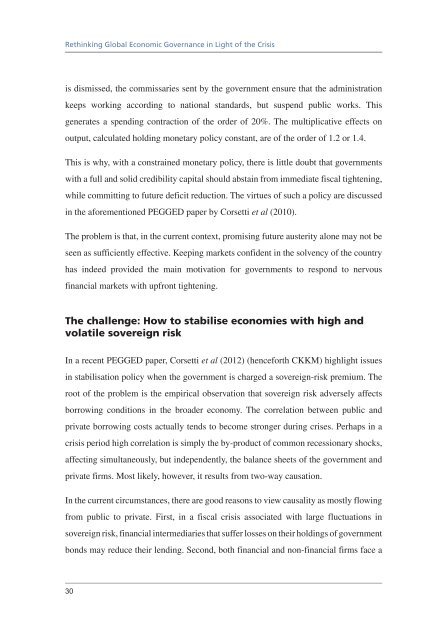Download PDF - Vox
Download PDF - Vox
Download PDF - Vox
- No tags were found...
Create successful ePaper yourself
Turn your PDF publications into a flip-book with our unique Google optimized e-Paper software.
Rethinking Global Economic Governance in Light of the Crisisis dismissed, the commissaries sent by the government ensure that the administrationkeeps working according to national standards, but suspend public works. Thisgenerates a spending contraction of the order of 20%. The multiplicative effects onoutput, calculated holding monetary policy constant, are of the order of 1.2 or 1.4.This is why, with a constrained monetary policy, there is little doubt that governmentswith a full and solid credibility capital should abstain from immediate fiscal tightening,while committing to future deficit reduction. The virtues of such a policy are discussedin the aforementioned PEGGED paper by Corsetti et al (2010).The problem is that, in the current context, promising future austerity alone may not beseen as sufficiently effective. Keeping markets confident in the solvency of the countryhas indeed provided the main motivation for governments to respond to nervousfinancial markets with upfront tightening.The challenge: How to stabilise economies with high andvolatile sovereign riskIn a recent PEGGED paper, Corsetti et al (2012) (henceforth CKKM) highlight issuesin stabilisation policy when the government is charged a sovereign-risk premium. Theroot of the problem is the empirical observation that sovereign risk adversely affectsborrowing conditions in the broader economy. The correlation between public andprivate borrowing costs actually tends to become stronger during crises. Perhaps in acrisis period high correlation is simply the by-product of common recessionary shocks,affecting simultaneously, but independently, the balance sheets of the government andprivate firms. Most likely, however, it results from two-way causation.In the current circumstances, there are good reasons to view causality as mostly flowingfrom public to private. First, in a fiscal crisis associated with large fluctuations insovereign risk, financial intermediaries that suffer losses on their holdings of governmentbonds may reduce their lending. Second, both financial and non-financial firms face a30














